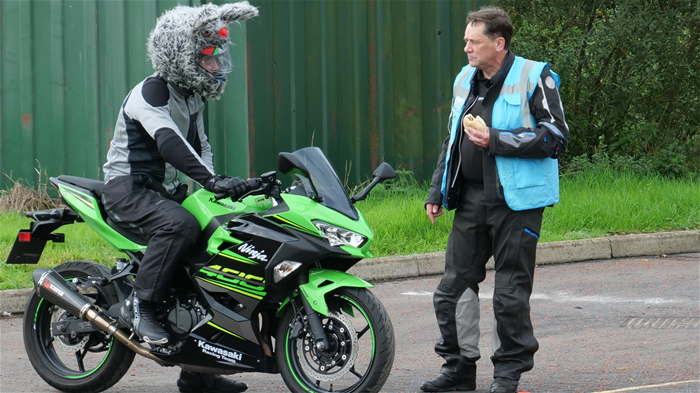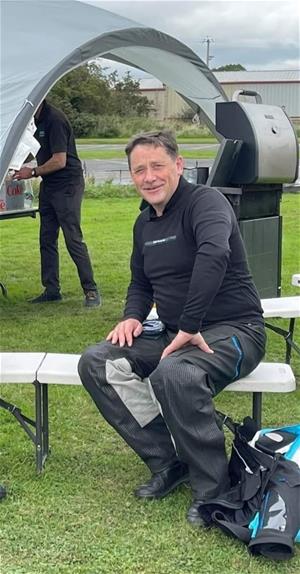The Thinking Observer
By Raymond Clarke
By way of explanation and as an indication of where I am on the journey that most, if not all, riders are on, I offer the following.
I have been riding motorbikes for more than 40 years and frankly I am surprised and pleased to have survived this far. I picked up my first machine in 1977 and had the basics of how it worked explained in a side street outside the bike shop. Off I set with no previous experience, to ride home through rush hour traffic.
I had had my car license for two years but hadn’t a clue about motorcycles, something which those who know me would say is still the case. I really didn’t have a clue, and this remained the situation for the majority of my motorcycling career. I still have my off days now, but things are never quite as bad as they were before I acquired a Skill for Life as the IAM Advanced qualification was once called.
My motorcycling ability only started to improve once I joined IAM in 2008. I subsequently qualified as an Observer, and over the next few years I attempted to hone my Observing skills and at the same time improve my own riding skills.
I worked with a variety of Associates with varying skill levels and differing personalities and derived immense satisfaction in seeing riders improve, often with a lightbulb moment, always mindful that I had been in their shoes, that there is always room for improvement and that skills learnt must be maintained.

Following on from the changes in the IAM and the transformation to IAM RoadSmart I became a National Observer and a Local Observer Assessor and my main focus moved to helping coach Trainee Observers. I still like to keep my hand in by continuing to Observe.
I have enjoyed each of my roles as I continue my motorcycling journey and I now offer a few personal observations.
One of the most important articles on motorcycling I have yet read is "The Thinking Ride” by Peter Rodger. Some Observers look for certainty and fixed courses of action with which to guide Associates.
There are a few certainties such as the requirement to stop at a red light or a stop line but even these can be contextualised with the words “it depends”. As demonstrated in “The Thinking Rider” there may be exceptions to every rule, such as where a juggernaut is bearing down on you, requiring the taking of avoiding action such as crossing a STOP line without halting etc.
Aside from such hopefully, rare events, The Thinking Observer is one who meets all the IAM RoadSmart core competencies and in addition, whilst reflecting on their own performance, continues to develop, greeting each new Associate with an open mind, prepared to adapt their own approach to meet the needs of the Associate.
The Thinking Observer is one who accurately assesses an Associate’s ability in terms of riding and understanding, and consequently designs a strategy in line with the ARC framework. The phrases, “It depends” and “what does the book say?” will be heard often in conversations between an Associate and a Thinking Observer.
The concept of the ‘reflective practitioner’’ is the epitome of the Thinking Observer. As Observers we should never shy away from seeking the views of our Associates, of our peers or from any other person we meet, on our performance and as to how we can improve. The old phrase of “there is no such thing as the perfect ride” can be paraphrased as "there is no such thing as the perfect Observer".
In my view the Thinking Observer should always be open to the possibility that an Associate may benefit from the input of a different Observer at any time but only if the Associate agrees.
The Thinking Observer is one who generally seeks to reduce stress and nurture a relaxed and fun learning environment. In my experience this provides the best learning scenario for most Associates but of course it depends on the Associate. A few may respond better to a more pressurised setting, and The Thinking Observer is one who will recognise this.
Similarly, in an observed session it may be advantageous for a Thinking Observer to have an Associate take them to a pre-determined destination that the Associate is familiar with, rather than encumber them with a series of directions. A more accurate demonstration of the Associate’s riding ability will likely result.
In closing and to collect my random ramblings I summarise…
My view is that the Thinking Observer is a concept that we should and can aspire to and whilst the certainties of gravity and the law are fixed, very few other definite ones exist.
'It depends’ is the guiding concept and the Thinking Observer will likely start and end most conversations with the phrase.
I have offered these thoughts solely to encourage discussion and would welcome all feedback


